Last Updated on May 30, 2021 by Skillslelo
Suppose, you want to tell somebody what your friend Riya said. There are two ways of doing this: Direct Speech and Indirect speech.
The first way, You can repeat Riya’s exact words without change:
Riya said, ‘I’m feeling ill.’
This type of reporting is called direct speech.
Direct speech refers to the direct quotation of something that someone else said.
It is sometimes known as quoted speech because we use quotation marks to show direct speech.
American English uses double quotation marks ( “ ” ), while British English typically uses single quotation marks ( ‘ ’ ).
The second way, you can use indirect speech:
Riya said that she was feeling ill.
When we tell other people what someone else told us without directly quoting that person, it is called indirect speech.
Indirect speech is also known as reported speech or indirect quotation.
In the reported speech, we write or present in our own words what someone else said.
Reporting and Reported Clause
Both direct speech and indirect consist of reporting clause and reported clause.
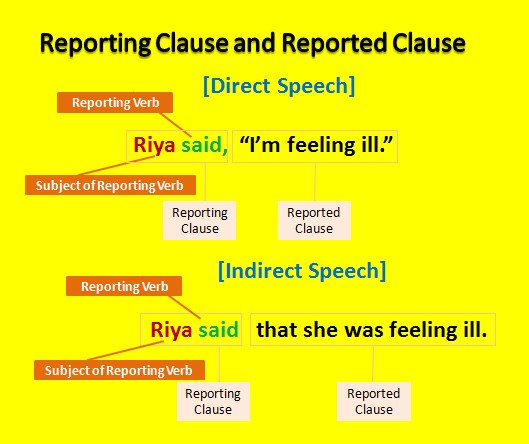
Reporting Verbs
We use reporting verbs to introduce the information that was spoken previously.
Both direct and indirect speech use reporting verbs.
The most common so-called “reporting verbs” are say, tell and ask.
1. Tell (Reporting Verb)
When we use tell, we need to use another person’s name or a personal pronoun as an indirect object after tell. ( tell somebody…). We don’t use to after tell.
For Example:
He told me he was sad. (Not “told to me”)
2. Say (Reporting Verb)
We can use to me etc after say if we want to, but we can’t say “He said me.”
3. Ask (Reporting Verb)
We can use to me etc after ask if we want to. “Are you comfortable?” He asked me.
Other reporting verbs include ask, instruct, explain, mention, suggest, claim, and many more.
Direct Speech to Indirect Speech
There are many rules for conversion from direct speech to indirect speech. These rules are as below:
1. Change in Punctuation
A direct speech can have : Question mark (?), Mark of Exclamation (!), or full stop (.) at the end of a sentence.
But reported speech has only full stop (.) at the end of the sentences.
Direct: He said, “Is he unhappy?”
Indirect: He said if he was unhappy.
Direct: He said, “What a beautiful flower!”
Indirect: He exclaimed that it was a very beautiful flower.
2. Change In Pronouns
Pronouns should be kept in mind when you change the narration from direct to indirect.
The change in pronouns of reported speech depends on the view of the reporter. See rules;
1. Change the 1st person (I, me, my, etc) according to the subject of the reporting verb.
See examples;
Direct: She said, “I had done my duty for my family and myself.
Indirect: She said that she had done her duty for her family and herself.
Direct: You said, “I will have completed my homework in class.”
Indirect: You said that you would have completed your homework in your class.
2. Change the 2nd person (you, your, etc) according to the object of the reporting verb.
For Example;
Direct: He said to her, “You had prepared your plan yourself.”
Indirect: He told her that she had prepared her plan herself.
Direct: She said to me, ” You know your enemies.”
Indirect: She told me that I knew my enemies.
If the object is not there then imagine a boy or a girl and change accordingly.
Direct: He said, “You will do your work yourself.”
Here I imagine a girl, then
Indirect: He said that she would do her work herself.
3. No change in 3rd person (he, she, her, etc)
Direct: You said, “She is writing a novel.”
Indirect: You said that she was writing a novel.
3. Change in Tense After Past Reporting Verbs
1. Simple present -> Simple past
In general, the present form in direct speech changes to the past form in reported speech:
Direct: She said, “I need help.”
Indirect: She said that she needed help.
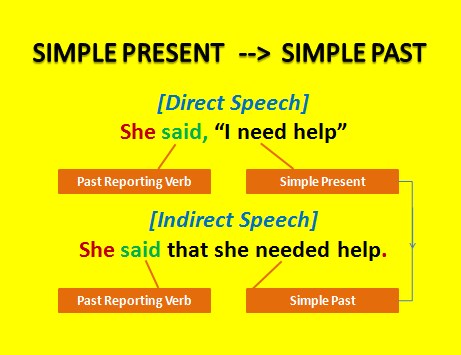
2. Present Progressive –> Past Progressive
Direct: She said, “My English is getting better.“
Indirect: She said that her English was getting better.
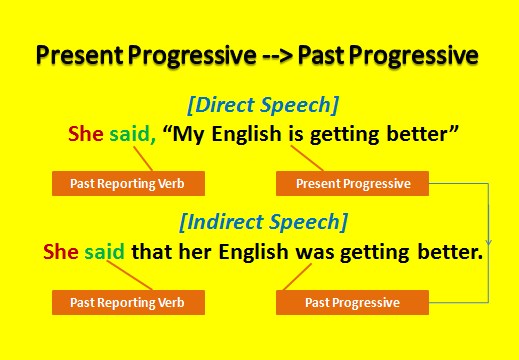
3. Present Perfect -> Past Perfect
Direct: She said, “I have read the book.“
Indirect: She said that she had read the book.
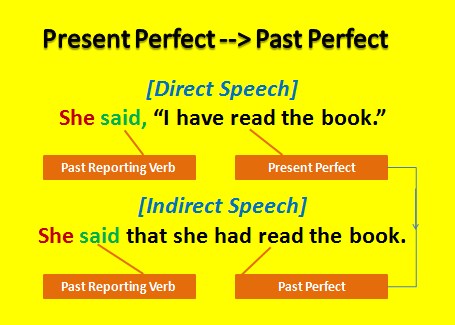
4. Past -> Past Perfect
Direct: She said, “Neha grew up in Kenya.“
Indirect: She said that Neha had grown up in Kenya.
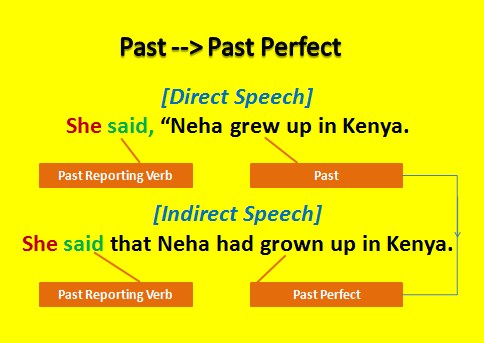
5. Will -> Would
Direct: They said, “The exam will be difficult.”
Indirect: They said that the exam would be difficult.
6. Can -> Could
DIRECT: I can fly!
INDIRECT: Poor chap – he thought he could fly.
6. May -> Might
Direct: They said, “We may come back early.”
Indirect: They said that they might come back early.
7. Past Perfect Tenses do not change.
Direct: He said, “I arrived late because I had lost the address.”
Indirect: He said that he had arrived late because he had lost the address.
8. Would, Could, etc: No change
Past modal verbs are usually unchanged in indirect speech.
Direct: He said, “It would be nice if we could meet.”
Indirect: He said that it would be nice if we could meet.
3. Reporting Verb in Present or Future
After present and future reporting verbs, tenses are usually the same as in the original (No Change)
Direct: He will say, ” I don’t want to play any more.“
Indirect: He will say that he doesn’t want to play any more.
Direct: He says, “Harry will be crossing the river.“
Indirect: He says that Harry will be crossing the river.
4. General Truth and Habitual Action
In the case of universal truth, general truth, and habitual actions, tense should not be changed. So the verb will be the same.
Direct: The teacher said, “Man is mortal.”
Indirect: The teacher said that man is mortal.
Direct: He said, “The sun rises in the east.“
Indirect: He said that the sun rises in the east.
5. Wh-Word Questions (What/When/Who etc)
Use ‘asked’ in place of ‘said’ and helping verb after the subject in the indirect speech.
Direct: You said, “What has she prepared?”
Indirect: You asked what she had prepared.
6. Yes-No Questions
When a yes-no question is reported indirectly, if or whether is used.
Direct: They said, “Is he trying to expose the secret?”
Indirect: They asked if he was trying to expose the secret.
Direct: He said, ” Will they get up early?”
Indirect: He asked if they would get up early.
7. Orders, Requests, or Advice
When we report orders, requests, or advice, we can use the infinitive form of the verbs that the other person has said.
Imperatives (orders):
Direct Speech: The teacher said, “Stand up straight!”
Indirect Speech: The teacher said to stand up straight.
Requests:
Direct speech: He said, “Can you take me to the airport, please?”
Reported speech: He asked me to take him to the airport.